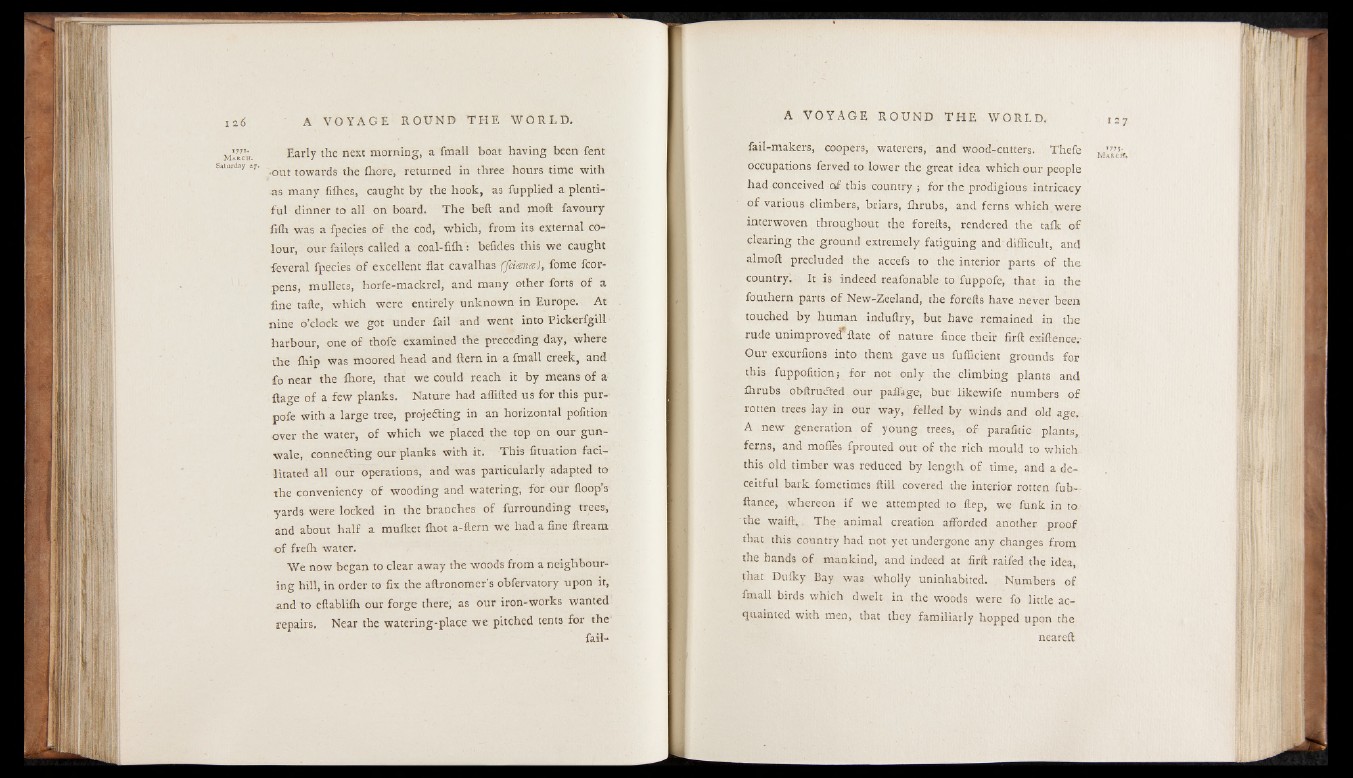
1772.
M a r ch .
Saturday 27
Early the next morning, a {mall boat having been fent
•out towards the Ihore, returned in three hours time with
as many fifhes, caught by the hook, as fupplied a plentiful
dinner to all on board. The beft and mod favoury
Mr was a fpecies of the cod, which, from its external colour,
our failors called a coal-fifli ■ befides this we caught
feveral fpecies of excellent flat cavalhas ffcitena), fome fcor-
pens, mullets, horfe-mackrel, and many other forts of a
fine tafte, which were entirely unknown in Europe. At
nine o’clock we got under fail and went into Pickerfgill
harbour, one of thofe examined the preceding day, where
the fhip was moored head and ftern in a fmall creek, and
fo near the Ihore, that we could reach it by means of a
ftage of a few planks. Nature had aflifted us for this pur-
pofe with a large tree, projedling in an horizontal pofition
over the water, of which we placed the top on our gunwale,
connecting our planks with it. This fituation facilitated
all our operations, and was particularly adapted to
the conveniency of wooding and watering, for our Hoop’s
yards were locked in the branches of furrounding trees,
and about half a mufltet {hot a-ftern we had a fine flream
of frelh water.
We now began to clear away the woods from a neighbouring
hill, in order to fix the aftronomer’s obfervatory upon it,
and to eflablifh our forge there, as our iron-works wanted
repairs. Near the watering-place we pitched tents for the
failfail
makers, coopers, waterers, and wood-cutters. Thefe
occupations ferved to lower the great idea which our people
had conceived of this country ; for the prodigious intricacy
of various climbers, briars, flirubs, and ferns which were
interwoven throughout the forefts, rendered the talk of
clearing the ground extremely fatiguing and difficult, and
almoft precluded the accefs to the interior parts of the
country. It is indeed reafonable to fuppofe, that in the
fouthern parts of New-Zeeland, the forefls have never been
touched by human induftry, but have remained in the
rude unimprove*flate of nature fince their firft exiftence.
Our excurfions into them gave us fufficient grounds for
this fuppofition; for not only the climbing plants and
fhrubs obftrucied our paflage, but likewife numbers of
rotten trees lay in our way, felled by winds and old age.
A new generation of young trees, o f parafitie plants,
ferns, and mofies fprouted out of the rich mould to which
this old timber was reduced by length of time, and a deceitful
bark fometimes ftill covered the interior rotten fub-
ftance, whereon if we attempted to ftep, we funk in to
the waift,, The animal creation afforded another proof
that this country had not yet undergone any changes from
the hands of mankind, and indeed at firft raifed the idea,
that Du (ley Bay was wholly uninhabited. Numbers of
fmall birds which dwelt in the woods were fo little acquainted
with men, that they familiarly hopped upon the
neareft